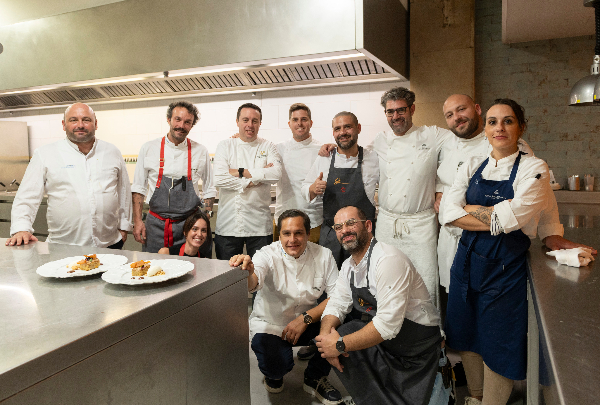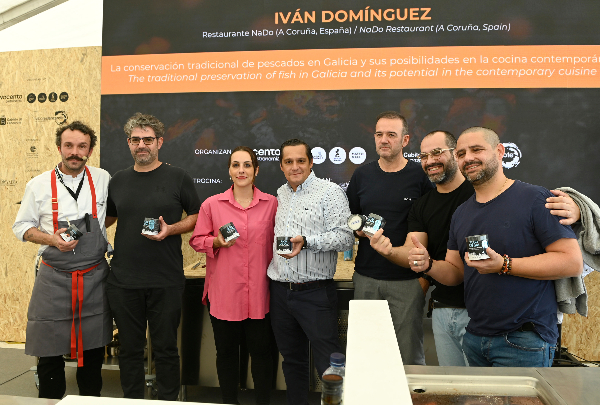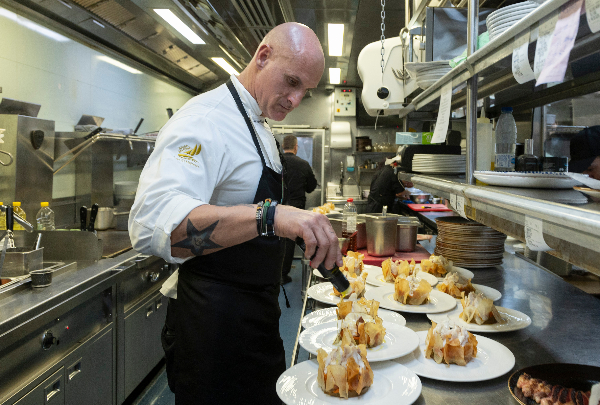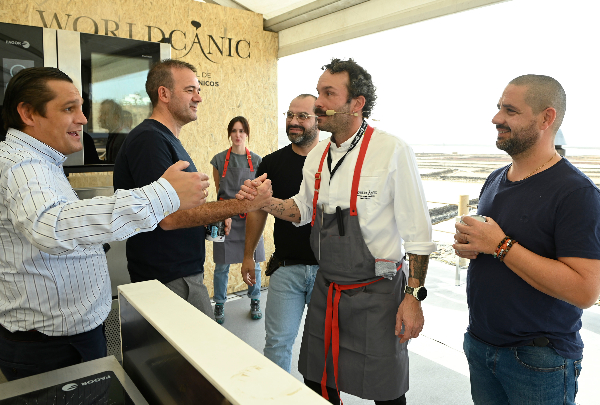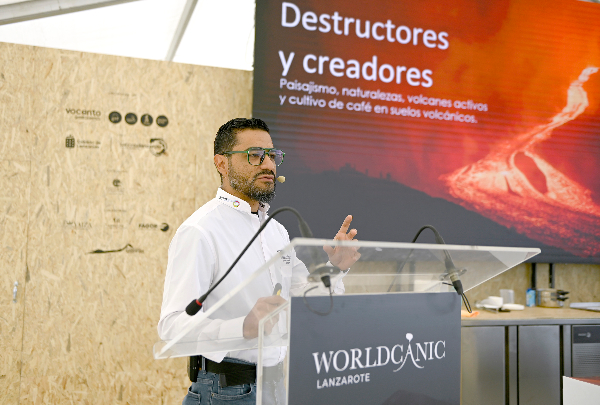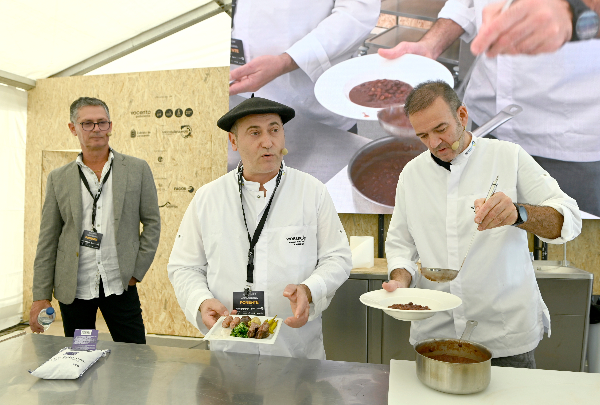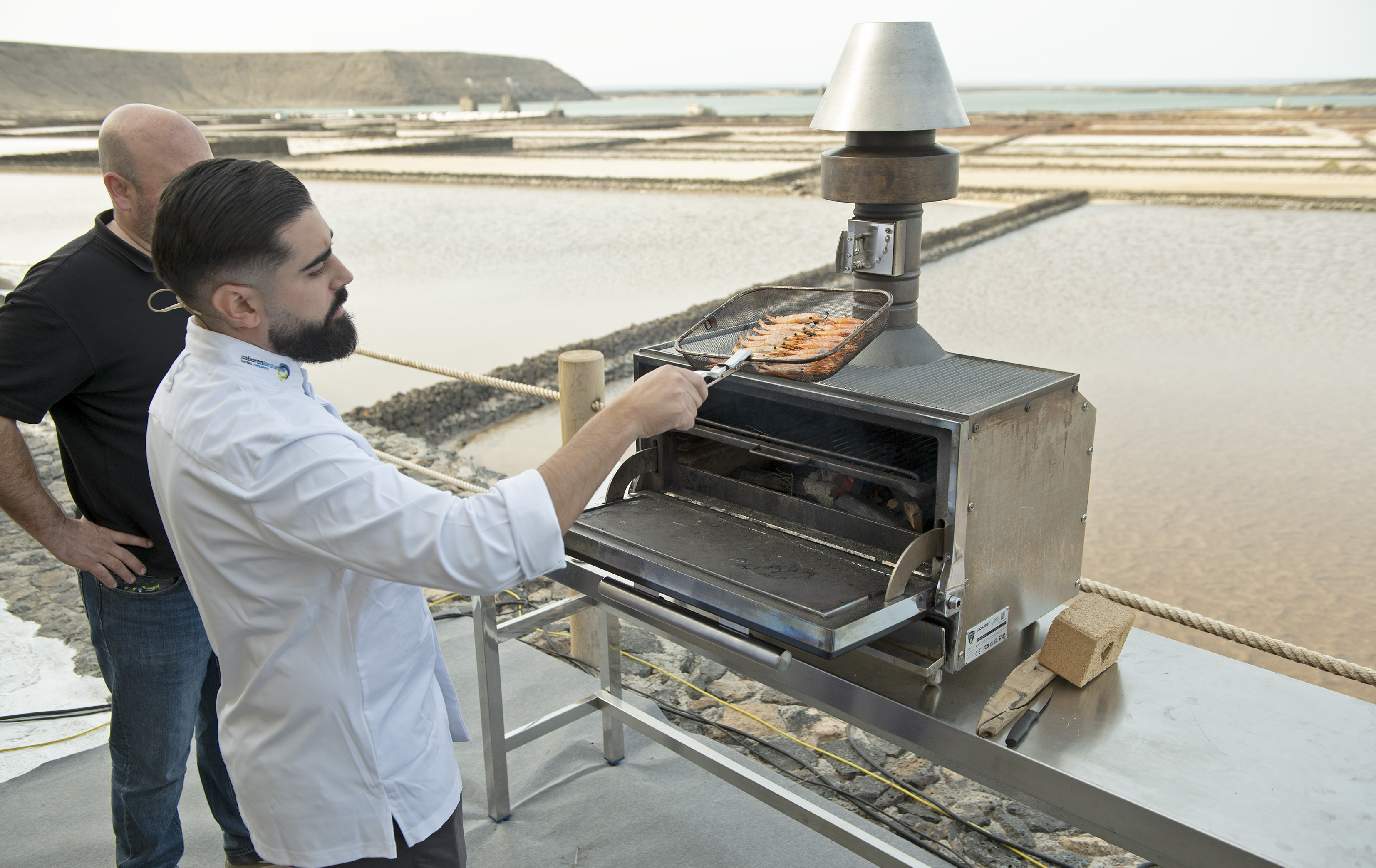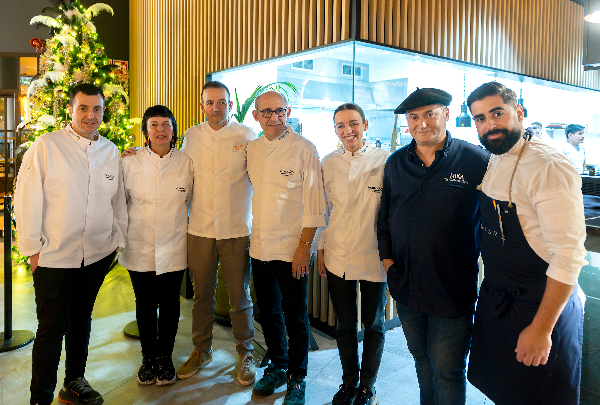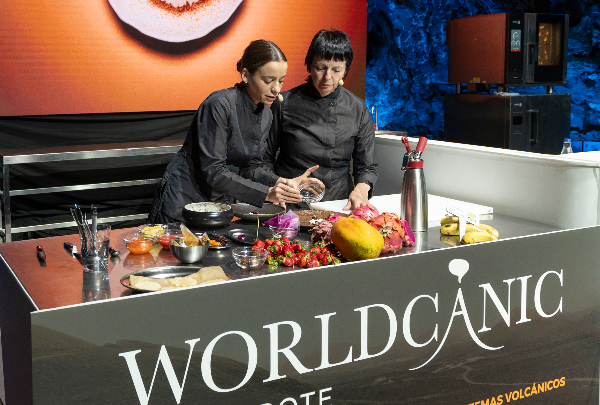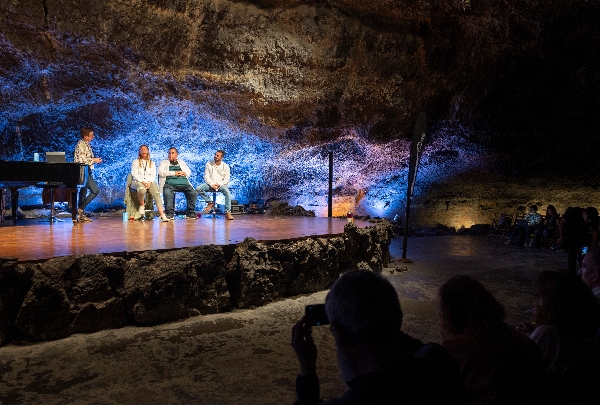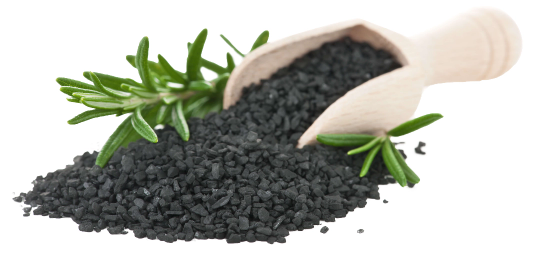News
Worldcanic 2023 claims the potential of volcanic systems with Sicily as guest territory
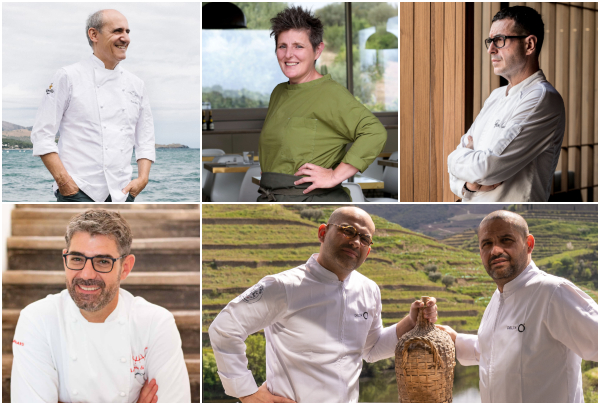
The cuisine and volcanic wines of Sicily will be represented at Worldcanic by Italian Michelin-starred chefs Viviana Varese and Accursio Craparo and sommelier Valentina Rizzi, while chefs such as Ricard Camarena and Fina Puigdevall have worked in the fields with unique products such as prawns from La Santa, pitaya flowers and strawberries from Lanzarote.
The third edition of Worldcanic, the International Meeting of Volcanic Cuisines and Ecosystems, will be held in Lanzarote on the 12th, 13th and 14th of December. Already consolidated as the global community of the world's volcanic societies, Worldcanic aims to showcase the potential of volcanic ecosystems, cradles of resilience where progress is born from the strength of the earth and its people.
It will once again bring together experts on volcanic environments from different parts of the world to highlight volcanic ecosystems as the axis of a natural, economic and identity-based life. Three days of touring around the island of Lanzarote to discuss and debate authenticity, sustainability and the projection of volcanic areas as environments of natural life and generators of unique products for their quality, flavour and purity.
Sicilian cuisine and science
This year, Sicily, the meeting point of the African and Eurasian tectonic plates and one of the areas with the highest number of volcanoes in Europe, particularly active ones such as Mount Etna, the symbol of Sicily in the world, which erupted again on Sunday 12 November, will be the host country of the congress. This is why one of Italy's most authentic and acclaimed chefs, Viviana Varese, will be attending the congress. With one Michelin star in Milan (Viva!*), Viviana Varese opened a restaurant in Sicily four years ago. It is from this land, eroded by the forces of nature, that she supplies the larder of her new restaurant, linking her cuisine even more closely to the land. Varese will be in Lanzarote to explain his experience at the W Villadorata Country Restaurant (Noto, Sicily), a restaurant that, like all those on the island, is marked by the effects of Mount Etna. Varese will be accompanied by Valentina Rizzi, the restaurant's sommelier. They will be joined by another Sicilian chef, Accursio Craparo, who has a Michelin star at his restaurant in Modica, Accursio Ristorante*.
Also from Sicily is Boris Behncke, a researcher at the Italian National Institute of Geophysics and Volcanology in Catania, one of the world's leading volcanologists. He will also receive the Worldcanic Award, which recognises work to protect volcanic areas. For several decades, Behncke has paid particular attention to Etna and, in particular, to the recent and current eruptive behaviour of this volcano.
Worldcanic will be a series of conferences, presentations, cooking demonstrations, wine tasting and gastronomic experiences, as the congress aims to show how gastronomy can link and enhance efforts in agriculture, agribusiness, tourism and culture, even in volcanic areas. This year there will be more novelties: we will see how chefs from non-volcanic areas and with different profiles are able to work and immerse themselves in the local products of Lanzarote, enhancing their potential. This year at Worldcanic we will see chefs who have worked with fish from the volcanic Atlantic or pork from farms with volcanic soil. There will also be more creative chefs who have already been to Lanzarote to get to know the local produce and adapt the proposals they will present at Worldcanic.
Camarena's journey
One of the chefs who will be coming to the island to talk about his experience with volcanic products is Ricard Camarena, chef at the Ricard Camarena Restaurant*** (Valencia, Spain). With a clear commitment to the Valencian garden and the sea, Camarena has been able to build a cuisine based on seasonality and the flavours offered by top quality produce. A few weeks ago, he travelled to the island to discover the uniqueness of the products offered by the volcanic terrain of Lanzarote and to prepare his intervention at Worldcanic. He came back surprised. Carabinero and prawns from La Santa, pitaya flowers and coastal herbs are some of the products he worked with in preparation for his presentation at Worldcanic.
Parrilleros, from the peninsula to Lanzarote
Grilled fish, so present on the Cantabrian coast, is coming to Lanzarote thanks to Isaac Loya, chef at the Real Balneario de Salinas* (Salinas, Asturias), who runs the family business that is one of the most important Asturian gastronomic sagas. A restaurant that worships seafood and treats it like few others. And one that can boast of being the first to give prestige to the now fashionable viceroy. Now it will show the potential of the Atlantic vieja and grouper, species that are very present on a coast that hides a multitude of underwater volcanoes on the seabed.
The brothers Óscar and António Geadas will also be presenting the black pig of Lanzarote. They are at the forefront of Portugal's new gastronomy and have made their love of the land the philosophy behind their G Pousada* restaurant in Bragança, in the Trás-os-Montes region, which has been awarded a Michelin star since 2014. There, his work with the native Bisaro breed of pig stands out. At Worldcanic, as well as being speakers, they will also be taking part in one of the gastronomic activities, cooking, among other things, the products of this black pig from Lanzarote, with which they have been working in their restaurant in recent weeks.
If there is anyone who knows all about volcanic areas and gastronomy, it is Fina Puigdevall and Martina Puigvert, chefs at Les Cols** (Olot, Girona, Spain). Mother and daughter, both chefs, share the same understanding of gastronomy, linked to a landscape, a history and a product, in harmony with the environment, and with the products of the most volcanic land on the Iberian Peninsula, La Garrotxa: buckwheat, potatoes from La Vall d'en Bas, maize, peasant corn, beans from Santa Pau, ratafia, chestnuts, turnips, mushrooms, etc. Some of the products from Lanzarote that will be featured in Worldcanic will be red pitaya, white pitaya, strawberries and bananas.
Girona, A Coruña, Gipuzkoa...
Other chefs who will be in Lanzarote are Paco Pérez (Miramar**, Llançà, Girona), Iván Domínguez, (Nado, A Coruña), Félix Belaunzaran (Iriarte Jatetxea, Berrobi, Gipuzkoa) and Roberto Ruiz (Hika Gastronomiko, Villabona, Gipuzkoa). Paco Pérez represents the haute cuisine of the Alt Empordà. A chef with a creative tenacity, a unique delicacy and precision in cooking the sea that seeps through the windows of his restaurant, where he creates a cuisine with influences from many origins, including Oriental and South American. A cuisine with a clear Atlantic vocation, a subtle and elegant style, and a Nordic touch in the use of Iván Domínguez's products will be another of the bets at Worldcanic. Off the coast of Galicia lies one of the largest underwater craters in the world, with a diameter of three kilometres, a length of 350 metres and a depth of between 2,500 and 2,800 metres. With Félix Belaunzaran, seasonal produce will once again be present at the congress, as it is in the family restaurant he runs with absolute respect for tradition. Roberto Ruiz has his own gastronomic project, based on local cuisine and products, in which the landscape surrounding the restaurant is the perfect accompaniment to his simple and honest recipes, with a strong link to the land. Years ago, he planted Tolosa beans in Toño Morales's ecofinca, a product that is emblematic of his cuisine. The result was surprising.
Local gastronomy will be represented by Toño Morales himself, owner of Ecofinca Vegacosta in Tinajo; José Francisco Medina (Alarz, Arrecife) or Germán Blanco (Brisa Marina, Playa Blanca). The list also includes Fernando Mora, one of the great figures of the wine world. Winemaker at Bodegas Frontonio (Zaragoza), his passion for winemaking has led him to become a Master of Wine (MW), a select club of experts that currently numbers 384 worldwide and only 6 in our country. With him, Worldcanic will take you on a journey through the different volcanic wines of the world and their peculiarities.
Scientific contributions
The scientific part of Worldcanic will also have important contributions this year. Such as Patrice Huet, scientific director of the Cité du Volcan (Reunion Island, France), who grew up with his head in the stars and his feet on the slopes of the Piton de la Fournaise, one of the most active volcanoes in the world. He is a member of the LAVE (European Volcanology Association). He will be joined by Llorenç Planagumà, scientific coordinator of the Volcano Active Foundation and the Garrotxa Geopark (Olot, Girona), a leading expert in the conservation of geodiversity, especially in volcanic environments. Enku Mulugeta Abraham (Ethiopia), geologist, volcanologist and tour operator, will also be visiting Lanzarote to talk about his work on the East African Rift and the active volcanoes of Ethiopia. Mulugeta has worked as a geologist exploring for gold, platinum and iron in the Bule Hora Wollega and Gimbi areas and is currently the secretary of the Association of African Volcanologists and is involved in a project to register the network of African Geoparks with UNESCO. Finally, Diego Rizzo (Guatemala) is a photographer and populariser whose work has been published in National Geographic and NASA's Astronomy Picture Of The Day (APOD).
Volcanic data
There are currently 1,500 known active terrestrial volcanoes, with an average of 96 erupting each year. Scientists estimate that there are nearly 1.5 million undersea volcanoes, 1,000 times more than the 1,500 active land volcanoes, and that nearly 75,000 of them rise one kilometre above the ocean floor.

